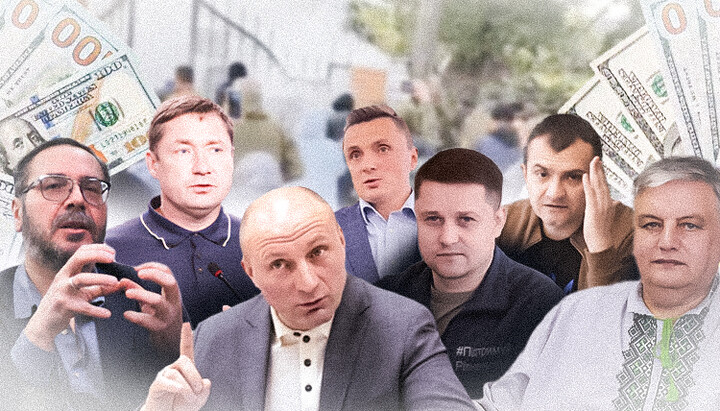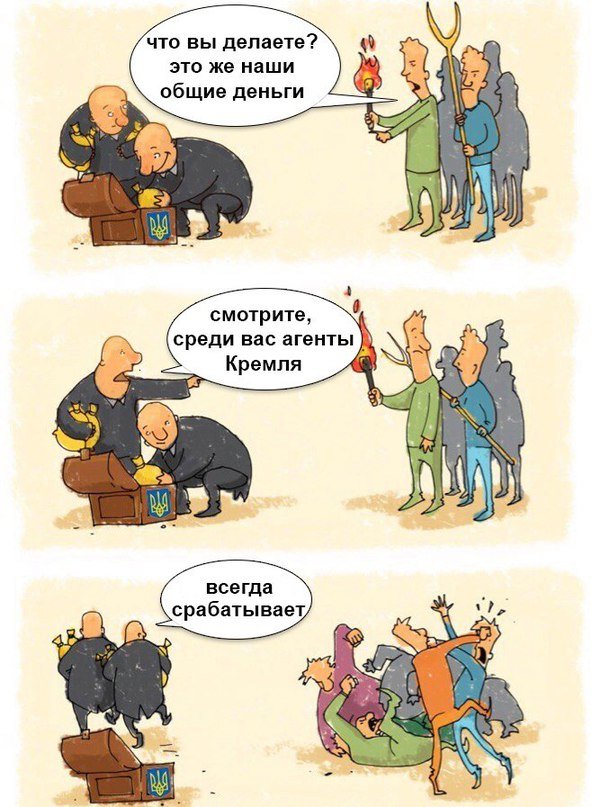"The Kremlin hand" in the people's pockets: who are they, UOC persecutors?

Too often those who attack the UOC the most turn out to be corruptionists or people with guilty consciences. Why?
Persecution of the Ukrainian Orthodox Church (UOC) in recent years has become part of the state's systemic policy. We have often heard that the necessity of banning the UOC is a "matter of national security". Deputies and politicians at all levels, followed by many Ukrainians, are convinced that it is impossible to be both a patriot of Ukraine and a member of the UOC at the same time. However, as it turns out, those who most loudly proclaim the defense of national interests are often the ones who are not averse to stealing a substantial sum from the people under the cover of these very cries.
Disguising their actions with rhetoric about national security, officials pursue purely mercenary goals – lining their pockets. The accusations against the Church for numerous violations are simply a diversion from their own crimes.
In this article, we will present several examples of how officials, who have been most outspoken against the Church, later found themselves either in the dock, under suspicion, involved in dubious schemes and machinations, or abroad.
Maxym Kozytsky, head of the Lviv Regional Military Administration
He became known for his loud statements against the UOC. It was Kozytsky who was behind the almost complete destruction of the UOC in the Lviv region, including the physical demolition of St Volodymyr’s Church in Lviv. At the end of November, he pathetically declared that there were no longer any UOC communities left in the Lviv region. Today, it is known that Kozytsky is suspected of embezzling millions of hryvnias in humanitarian aid, constructing a "family" road worth 25 million hryvnias leading to a resort owned by his father, as well as having indirect ties with the Russian "Gazprom".
Anatoliy Bondarenko, Mayor of Cherkasy
Cherkasy became notorious for the most shocking and bloody clashes during the "voluntary transfers" to the OCU. First, the seizure of the Nativity of the Virgin Monastery in 2023, and then the seizure of the Archangel Michael Cathedral. The whole world saw footage of UOC believers and clergy being brutally beaten by OCU activists when their legs, arms, and jaws were broken, when they were gassed and shot at with traumatic weapons.
Naturally, all this would have been impossible without the support of the city leadership. However, Bondarenko not only did not hide this but even boasted of his involvement in the seizures. In particular, after the seizure of the cathedral, the OCU elected him as the head of the parish council. And just before the takeover, the mayor personally announced its "transfer" to the OCU.
Why such activity? The fact is that Bondarenko has long been accused of corruption. Back in 2017, the Prosecutor's Office issued him a notice of suspicion under Part 2 of Article 364 of the Criminal Code of Ukraine ("Abuse of power") for illegal enrichment worth several million. Publications about this appeared on the all-Ukrainian "Suspilne". Prior to this, local journalists from "Lakmus" and "1800" relentlessly questioned the mayor about his huge estate on the bank of the Dnieper River, the land for which he had bought at bargain basement prices. The entire city is buzzing about Bondarenko's schemes. Apparently, through bloody attacks on "Moscow priests", the mayor decided to prove his patriotism and silence his critics.
Former Mayor of Rivne, Oleksandr Tretiak
While holding office as mayor, Tretiak ran an active campaign against the UOC, strongly supporting the forced "transfers" of communities to the OCU. At the same time, his public service was tainted by corruption scandals. According to the National Anti-Corruption Bureau of Ukraine (NABU), Tretiak was accused of "violating the requirements for preventing and resolving conflicts of interest". In particular, he paid additional bonuses and salaries to the office staff of the city council, for which the court removed him from his position for one year.
It is noteworthy that just one year after taking office as mayor of Rivne, Tretiak bought a house at half the market value, partly financed by a consumer loan from Oschadbank for 30 years. The official told journalists he had bought the house for less than 3 million hryvnias, or about 90,000 dollars. However, it later emerged that the same house had been sold just a month earlier for 220,000 dollars.
Fedir Androshchuk, head of the National Museum of Ukraine’s History
It was Androshchuk who oversaw the demolition of the Tithe (Desiatynnyi) Monastery, calling it "rubbish". He also organised fundraising for the demolition of the shrine. On his Facebook page, Androshchuk wrote: "It will be very symbolic to finish this clean-up by Easter! Therefore, we ask all concerned citizens to support the fundraising. Let's protect our history and culture together!"
After some time, he left the country. According to MP Solomiya Bobrovska, Androshchuk went on a business trip and disappeared. "Apparently, he took advantage of his other citizenships (why he has them is another question), went on a trip to Italy and Sweden, and according to the response to my parliamentary inquiry, he went missing at the opening of an exhibition in Lithuania," Bobrovska wrote. No one has explained how a high-ranking official, in violation of Ukrainian law, holds another citizenship.
Meanwhile, Androshchuk stated that he lives and works in Sweden, whose citizen he is and where he pays taxes. In other words, the official who was involved in the demolition of our sacred sites had no intention of living in Ukraine. He has held the passport of another state (in this case, Sweden) for several years.
Oleksandr Supruniuk, Mayor of Netishyn
Supruniuk became ill-famed for his harsh attacks on the UOC. He publicly referred to the Church as "biological weapons" and actively supported the seizure of temples. Subsequently, it turned out that his activities were aimed solely at personal enrichment. The situation is aggravated by the fact that Supruniuk profited from the war. For example, drones purchased by the executive committee of the Netishyn City Council at Supruniuk's behest for over 20 million hryvnias contained components much cheaper than those declared, causing a loss to the budget of more than 6 million hryvnias.
Serhiy Hamaliyi, former Head of the Khmelnytskyi Regional Administration
Hamaliy is another "patriot-foreigner" on our list. According to media reports, he holds a Polish passport, a fact he concealed when appointed to his position. He also kept his long-standing connections with the criminal world under wraps. In 1997, law enforcement detained him for drug possession and racketeering as part of a criminal group. As head of the Khmelnytskyi Regional Military Administration, Serhiy Hamaliy actively organized the transfer of UOC communities to the OCU. His methods included forging believers' signatures and using administrative pressure. Over 30 complaints from UOC believers were submitted to the courts, reporting coercion to "transfers". On 14 March 2023, Hamaliy was dismissed from his position following a scandal involving drunk driving. A few months later, he made his declaration public, revealing that he earned 17 million hryvnias in 2023 and that his wife had purchased a 180-square-metre house in Poland.
Oleksandr Symchyshyn, Mayor of Khmelnytskyi
Symchyshyn is well known for his aggressive attacks on the UOC. In the spring of 2023, Khmelnytskyi became a record-breaker for the number of temples transferred to the OCU, carried oud by Symchyshyn's administration and, of course, with his knowledge. He also found himself at the centre of a corruption scandal.
But even here, the "refined patriot" turned out to be a corrupt official. He implemented a scheme "straight from the repertoire" of Ostap Bender: the city takes out a loan for a waste processing plant, which is paid off from the city budget, and then waste removal companies raise their prices. This created a situation where the city's residents paid twice, and the potential amount of embezzlement exceeded one billion hryvnias. Meanwhile, the declared loan amount was 28.5 million euros, while the total cost of the project was 36.5 million euros. This discrepancy attracted the attention of representatives from the European Bank for Reconstruction and Development (EBRD).
Mykhailo Holovko, head of the Ternopil Regional Military Administration
Mykhailo Holovko made highly expressive calls to the central government to transfer the Pochaiv Lavra to the local council. Why? To expel the UOC from there and hand it over to the Uniates. He stated that the regional council would initiate an appeal to Kyiv to transfer the Pochaiv Lavra into the ownership of the regional community. "And we will already find a way to expel the Russian Church from there, we will find a way to break the contract," Holovko promised.
He made this statement on 21 June 2023, and just five days later, on 26 June, Holovko was arrested for extorting nearly 1.8 million hryvnias from a volunteer in exchange for signing completion acts for construction and repair work on municipal facilities.
Conclusions: Corruption and persecution of the Church as related phenomena
We have presented only seven examples of the most prominent "patriot-corruptionists". In reality, there are many more. Their tactics are simple yet highly effective – to pit the people against each other to distract them from their shady dealings. There is a cartoon on the web that very accurately captures the essence of this strategy.

Thus, it becomes clear: the persecution of the UOC often serves as a "security smokescreen" for corrupt schemes. Shout about "Moscow priests", and suddenly you are a refined patriot beyond any suspicion. Ukrainian officials act like skilled manipulators and con artists – with their talk of "agents in cassocks", they simply distract public attention from their own crimes. By loudly proclaiming from high podiums that the Church should be banned, they create the illusion of fighting for national interests, while simultaneously increasing their personal wealth.
In other words, if you hear politicians claiming that the Church is the "Kremlin hand", pay close attention to where their own hands are at that moment. Because in 99 out of 100 cases, those hands are reaching into your pockets.











